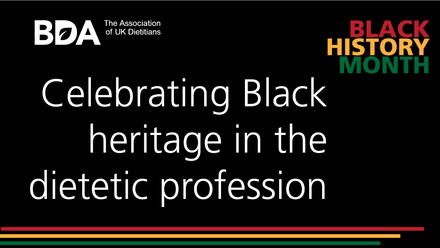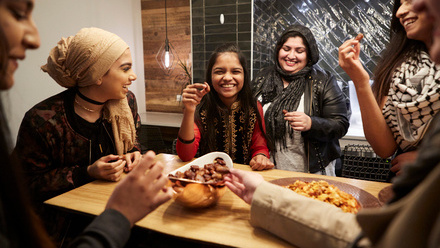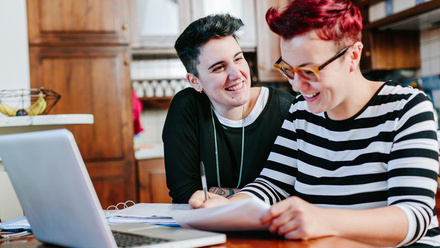Caroline Frascina and Claire Gardiner explain what they have learned from BAME AHPs about improving ethnic diversity in the allied health professions.
As dietitians passionate about increasing diversity and inclusion in the profession, we attended an event earlier this year that shared experiences and research regarding Black, Asian and Minority Ethnic (BAME) representation in the allied health professions.
Caroline’s commitment to diversity comes from the twin perspectives of promoting the variety of roles and settings dietitians can work within – in particular mental health – but also increasing the diversity of those working in the profession so that our future workforce reflects the communities we serve.
In addition to her academic commitments at Leeds Beckett University (LBU), Claire is a committee member of the Equality, Diversity, and Inclusion group for the school of Clinical and Applied Sciences, representing the nutrition and dietetic group. Working closely with other AHP professionals, the last 18 months has provided an opportunity for the committee to explore and understand the differences between BAME students with regards to applications as well as attainment when studying healthcare at LBU.
The event we attended provided an opportunity for research and experiences undertaken within academia as well as on clinical placement to be shared and discussed with AHPs in practice. The afternoon consisted of a series of presentations, outlined below.
BME Experiences in Higher Education: Qualitative Study
Dr Angela Murphy is a registered occupational therapist and senior lecturer at LBU. Together with Claire Gardiner, a qualitative study was conducted in 2020 to explore the experiences and perceptions of Black and Minority Ethnic (BME) students studying on healthcare courses at LBU.
Data collected through an online focus group and semi-structured interviews were analysed and several themes emerged. Two particular themes were quite prominent and considered influential in the application to higher education as well as the experience during academic studies.
Socio-economic status was felt to impact on the quality of education experienced, reducing their chances to gain the grades required to study in healthcare. The ability to afford living costs led to having to work during academic studies which the participants perceived as differing from many of their peers. A significant lack of representation was noted when exploring healthcare professionals online, in clinical practice as well as within the university setting and resulted in some students feeling they didn’t belong. From case studies used as teaching resources, literature referred to widen learning, to the acknowledgement of religious festivals or cultural events, the participants recommended greater diversity and inclusion.
The learning from this study alongside the analysis of application and attrition data from the school has provided a springboard for where to focus change, including the remarketing of healthcare courses, addressing unconscious bias in all staff involved in open days and the interview process, and viewing teaching and learning through an inclusive lens. The journey ahead may feel long and arduous, but the worth will be significant.
WY&H AHP Faculty: BAME AHP Staff experiences
The West Yorkshire and Harrogate (WY&H) AHP Faculty took on a project in March 2020 to evaluate equality, diversity and inclusion and the promotion of AHP careers and consider what actions could be initiated to facilitate change to the current culture.
Alice Trull, an occupational therapy student studying at LBU, presented alongside Caroline Frascina the results of the BAME AHP staff experiences questionnaire which gathered perspectives across the North Yorkshire and Humber region. Data collected from the questionnaire were analysed and key recommendations emerged.
I have no role models
- AHP careers need to be actively promoted to a greater diversity of individuals and promotional resources need to ensure they provide role models for these individuals
- Recruitment should strive for increased representation from BAME employees within AHP workforces at all levels, particularly in higher bands and in management and leadership roles to promote ambition in BAME staff and to reflect the diversity of patient populations
- Mentoring schemes should be offered to BAME staff members to support and encourage career progression and provide support for instances of racism or discrimination
Respect my religious, spiritual, and cultural needs
- Workplaces would benefit from an increased understanding and management recognition of religious, spiritual and cultural needs, for example celebration of non-dominant religious festivals such as Diwali and Eid
- Appropriate prayer facilities should be provided in the workplace
Be an ally
- Staff should be encouraged to actively listen to and acknowledge experiences of racism and discrimination in the workplace, including racism from patients and staff
- Staff and management should have high quality and up-to-date training about unconscious bias and covert racism. Non-BAME staff at all levels should be supported to seek information on being an effective ally
- Tackling racism within the workplace should be everyone’s responsibility not only that of BAME staff members
Break the glass ceiling
- More band 7 and above AHP positions should become available, and managers should actively encourage BAME employees to seek these positions
- CPD and non-mandatory training opportunities should be made equally available for all staff
- There should be increased BAME representation within recruitment panels to reduce risk of unconscious bias and increase BAME staff ambition
Based on these recommendations, the WY&H AHP Faculty has been working across the region to action the following:
- Creation of the campaign ‘Aspiring Allies’ which will promote AHP careers through the lens of equality, diversity and inclusion. The campaign includes a website, printed resources and social media accounts
- Development of a culturally aware workforce including the development of an interfaith calendar, Ramadan resource for health professionals and a plan to integrate allyship training into preceptorship programmes
- Development of a Workforce Ambassador Network who will actively promote AHP careers to diversity of groups
- Development of a diversity and inclusion best practice guide for recruitment
Decolonising the curriculum
Tracy Metcalf and Beth Chesworth, occupational therapy students from Bradford University, presented their Role Emerging Placement (REP) project which focused on Decolonising the Occupational Therapy Curriculum. Colonialism refers directly to the exploitation of lands and resources by European systems of domination.
Decolonisation refers to the process of liberation from this system of domination. The project comes from the starting point that curriculums in the United Kingdom are dominated by White European or Western worldviews; the same worldviews that are responsible for colonialism. In many educational institutions, there is a wide disconnect between what the curriculum teaches and the community that the curriculum is meant to serve, which risks marginalising BAME students, impacting their engagement, academic performance and sense of belonging.
The literature highlights how in society, we would only mention someone’s ethnicity if it wasn’t white – as this whiteness is the ‘default’ and assumed. This is similar for gender and sexual orientation. The assumed ‘default’ demographic of persons in the UK is white, heterosexual and cis-gendered, yet this does not reflect the diversity of the population.
Recommendations based on review of literature, evaluation of case studies and survey of student experiences are:
- Focus groups – paid roles specifically for Black, Asian and Minority Ethnic groups to collaboratively contribute to the design of the curriculum. This ensures that assumptions and stereotypes are avoided and that any changes in the curriculum are done in collaboration with the people who are being represented
- Review reading lists – include range of literature relevant from different cultural perspectives
- Biography for case studies – to prepare students for diversity of the patients that they will encounter in practice. To include name, age, gender identity, sexual orientation, cultural/religious identity and whether they have children
- Complaints procedure support for students – clear directions and support on how to raise concerns about discrimination, harassment and microaggressions
- Blind grading for written elements of AHP courses
- External training on anti-discrimination and accountability for staff and students, focusing on being anti-racist, not just non-racist, white privilege and micro-aggressions.
Lorna Campbell
Lorna Campbell is a registered physiotherapist and course director in physiotherapy at LBU. Lorna started her Ed Doc in 2017, exploring the experiences of students of colour engaged in pre-registration physiotherapy education. Lorna is interested in how physiotherapy came to exist as an independent profession; the factors which were at play that created this profession along racial, gender and class lines, and the ongoing impact this has had and continues to have in creating practices, or ways of performing physiotherapy [including physiotherapy education] that reinforce whiteness.
Dr Blaine Robin
Blaine Robin, a registered occupational therapist who recently joined the school of Clinical and Applied Sciences at LBU as a senior lecturer, spoke of his long-standing ambition to work as a university lecturer. For more than 10 years, Blaine unsuccessfully interviewed for university lecturing roles in over a dozen universities throughout England. His inspirational narrative demonstrated his drive and motivation, completing his PhD in 2010, taking a position as a local politician between 2008 and 2012, all as ways to demonstrate his abilities. Although Blaine’s story was difficult to hear, his impetus to create change was empowering.





